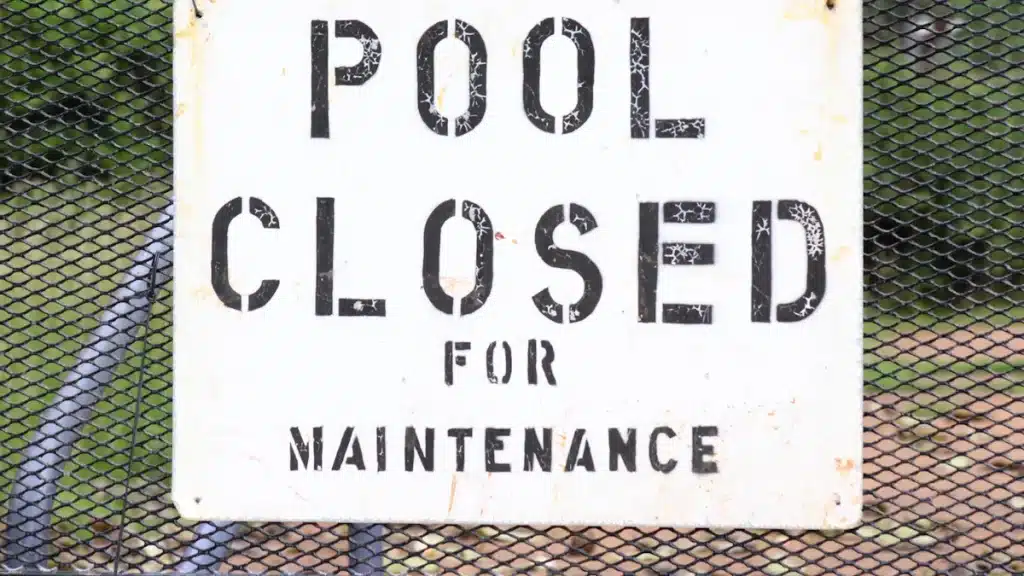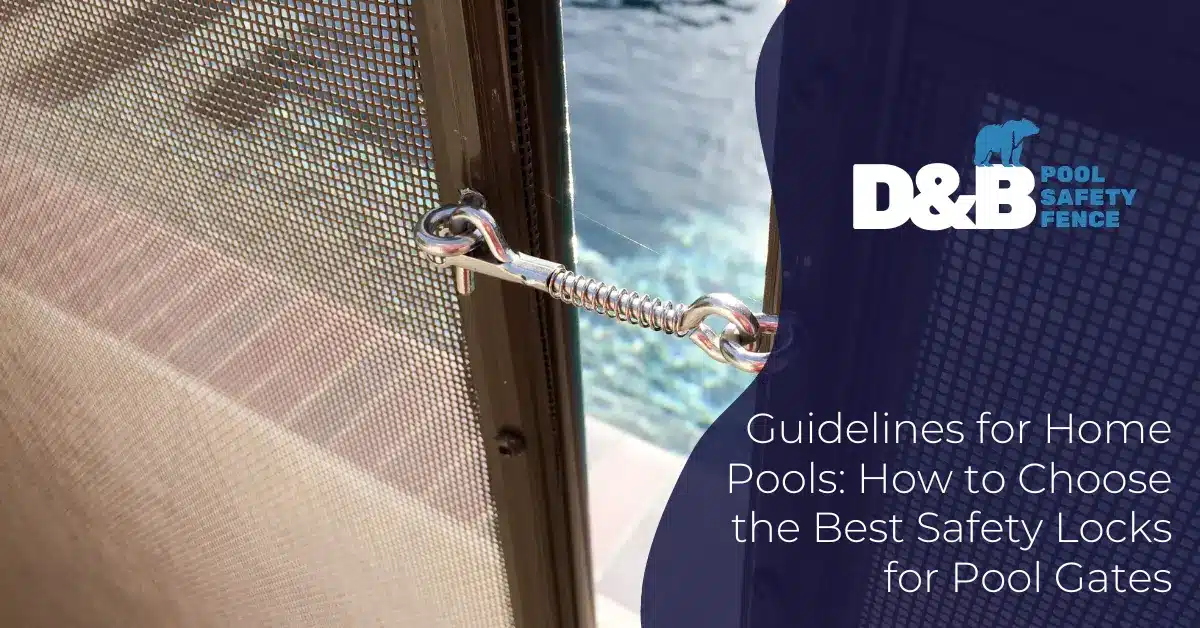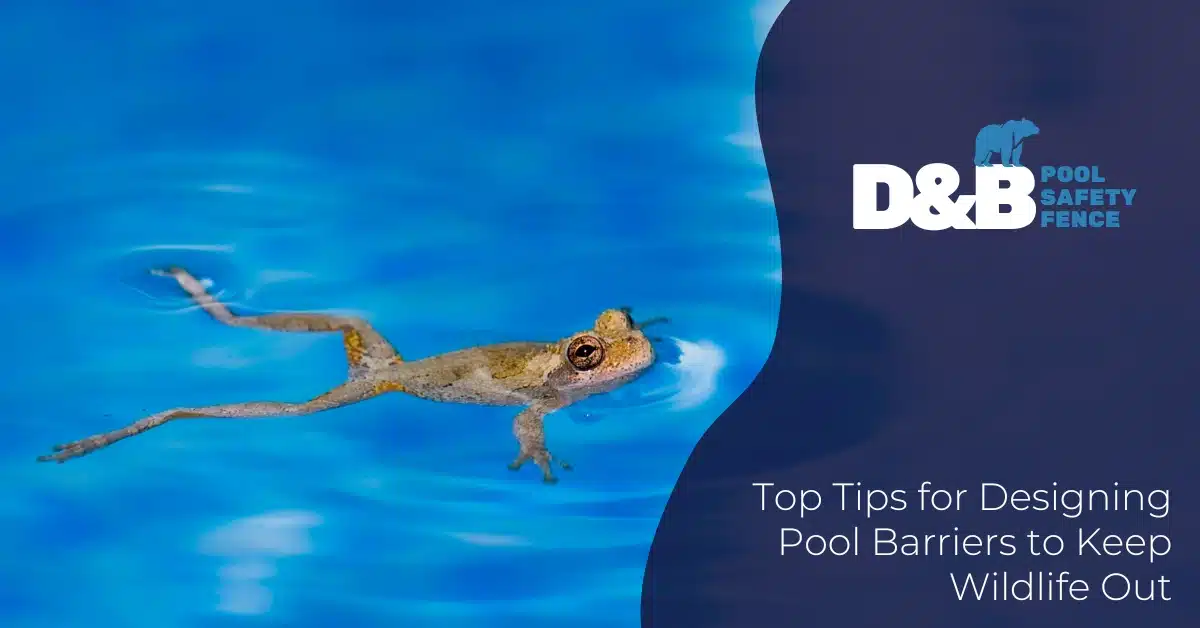Pool safety is very important for every homeowner. Each year, many children get hurt in pool accidents. However, pool gates are the main barrier to stop these accidents. In particular, safety locks on pool gates are key to keeping the area safe. Studies show that good locks can prevent half of child drowning cases. Because of these studies we know that making sure pool gates have strong safety locks can save lives and give peace of mind.
Understanding Safety Rules for Pools and Pool Gates
National and State Rules
Federal Guidelines Overview
Federal rules are the base for pool safety. For example, the Virginia Graeme Baker Pool and Spa Safety Act says all public pools need anti-entrapment devices. This law stops accidents from pool drains. Hence, Homeowners with pools should use similar safety steps. Federal rules suggest self-closing and self-latching gates in particular. Specifically, these gates should open away from the pool area and locks should be high so kids can’t reach them.
State-Specific Rules
Each state has its own pool safety rules and some states require certain locks. Such as California saying pool gates must have self-closing and self-latching systems. However, Florida says pool barriers must be at least four feet high. Meanwhile, Texas needs alarms on gates. Always check local laws to follow the rules.
Why Following Pool Safety Regulations is Important
Legal Issues
Not following pool safety rules can cause legal problems. Specifically, authorities may fine homeowners who don’t meet safety standards. As mentioned earlier, leaving a pool gate open can break the law and breaking these rules can lead to penalties. Because of this, homeowners should always keep gates closed and locked.
Safety Benefits
Following safety rules gives peace of mind. Of course, good pool gate latches meet safety standards. Proper locks stop people from getting into the pool area without permission. Self-closing gates in particular, lower accident risks. Following safety standards can save lives.
Pool Fence and Pool Gates Rules
Pool Fence Code Rules
Federal and State Codes
Federal and state codes are the base for pool safety. The Virginia Graeme Baker Pool and Spa Safety Act requires anti-entrapment devices for public pools. Homeowners should use similar steps for home pools. Federal rules suggest self-closing, self-latching gates. These gates should open away from the pool area. Locks must be high so kids can’t reach them.
State laws differ, so check local rules. California needs pool fences for pools built or fixed after 2007. Florida wants barriers at least four feet high. Texas needs alarms on pool gates. Following these codes keeps you safe and legal.
Local Rules
Local rules might have extra needs. Some places have special rules for above-ground pools. Always ask local authorities to get correct info. Not following rules can lead to fines and legal trouble. Local rules often meet community needs. Following them helps keep everyone safe.
Sufficient Pool Fence Height
Minimum Height Rules
A good pool fence stops young kids from getting in. The minimum height is usually four feet. This height stops climbing and sneaking in. Check local rules for exact heights needed. Taller fences give better safety.
Stop Climbing
Stopping climbing is key for pool safety. Make sure the fence has no footholds or gaps. Vertical bars should be close together, not far apart. Avoid horizontal bars that kids can use as steps. Put a smooth top on the fence to make climbing hard.
Pool Gates for Additional Safety
Self-Closing, Self-Latching Gates
Pool gates need self-closing, self-latching parts to work right. These parts make sure the gate closes by itself and locks after closing, stopping people from sneaking into the pool area without permission.
Latch Positioning
Put latches high so kids can’t reach them easily—at least 54 inches above ground level is best. Install the latch on the pool side of the gate for extra safety layers.
Types of Safety Locks for Pool Gates
Mechanical Locks for Pool Gate Safety
Keyed Locks
Keyed locks are old but reliable. Unsurprisingly, they need a key to open and offer good security. Losing the key can be a problem. Sharing keys with family can be tricky too. Keep extra keys safe for easy access.
Combination Locks
Combination locks don’t need keys, you enter numbers to unlock them instead. In particular, they are handy for big families. Pick a code that’s easy to remember but hard to guess. Change the code often to stay secure.
Electronic Pool Gate Locks
Keypad Locks
Keypad locks use number pads for entry. You can simply enter a code to open the gate. No keys needed, which is convenient. These locks need batteries, so check them often. Some have lights for night use.
Smart Locks
Smart locks are high-tech and connect to phones or devices. What’s more, you can lock or unlock using an app. They have features like logs and alerts but also need batteries. Regular checks keep them working well.
How to Pick the Best Safety Locks for Your Pool Fences
Strong and Long-Lasting Pool Gate Locks
Handles Weather
Pick locks that can handle all kinds of weather. Rain, snow, and sun can harm weak locks. In particular, good materials like stainless steel or brass are better. For example, they stop rust and last longer. Weather-proof locks keep your pool safe for a long time.
Stops Rust
Rust makes locks weak over time. Choose locks made from rust-proof stuff. Stainless steel and brass are great choices. These materials stay strong even in wet places. Rust-proof locks work well near salty pools.
Easy to Use Locks for Pool Gates
Simple Setup
Easy setup saves you time and trouble. Find locks with clear steps and all parts included. Some come ready to use right away. Getting a pro to install them makes sure they fit right and are safe.
Everyday Use
Using the lock every day should be easy. Keyed locks need a key, which is very secure. Combination locks use numbers, so no keys needed. Electronic ones have keypads or smart options. Pick one that fits your daily life best.
Lock Safety Features for Pool Gates
Hard to Tamper With
Locks that are hard to mess with add safety. They stop people from getting in without permission. Hidden screws and strong parts make them tough to break into.
Alarms
Alarms tell you if someone tries to get in without permission. Some locks have alarms that go off when tampered with or send alerts to your phone. This extra feature keeps your pool area even safer.
Installation and Maintenance Tips

Proper Installation Techniques
Tools Needed
To put in pool gate locks, you need some tools. Get a screwdriver, drill, measuring tape, and level. Use stainless steel screws because they last long. Make sure all tools work well.
Step-by-Step Guide
- Measure where the lock will go. The latch should be 54 inches high.
- Mark the spot with a pencil.
- Drill holes at the marks. Keep them straight.
- Attach the lock with screws. Tighten them well.
- Check if it’s level and adjust if needed.
- Test the lock to see if it works right. The gate should close and latch by itself.
Regular Maintenance
Inspection Checklist
Check your pool gate locks often to keep them working:
- Look for rust or corrosion on the lock.
- Make sure screws are tight.
- Test if it closes and latches by itself.
- Ensure kids can’t reach the latch.
- Check for any wear or damage.
Common Problems and Fixes
Fix common problems quickly to stay safe:
- Rust or Corrosion: Clean with rust remover and add a protective coat.
- Loose Screws: Tighten with a screwdriver; replace missing ones.
- Faulty Mechanisms: Lubricate moving parts; replace broken pieces.
- Misalignment: Adjust the lock so the gate closes properly.
Following these steps keeps your pool area safe and secure at home. Use this guide to meet top safety standards for your pool fence.
Go over the main ideas shared. Pick the best lock for your pool gate to keep it safe. Follow all safety rules to protect your family and friends. Check and fix your locks often to keep the pool area secure. A good pool gate lock can stop accidents and make you feel at ease.






